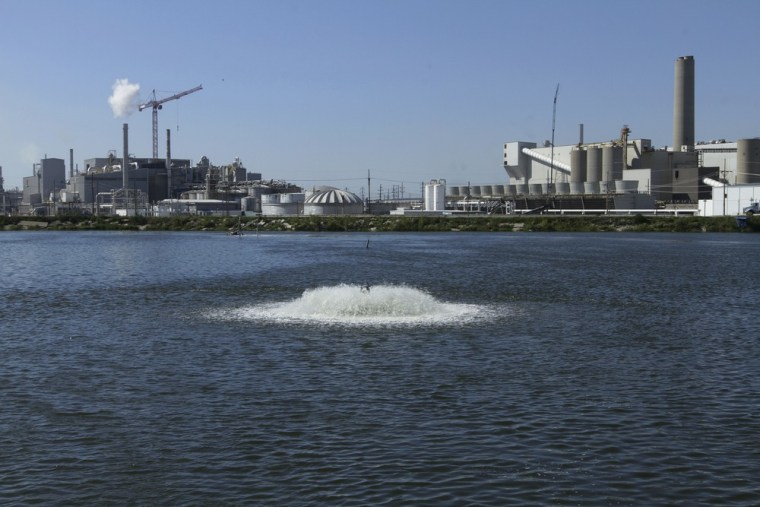DECATUR, Ill. -- At the height of this year's drought, decision-makers at the agribusiness giant Archers Daniels Midland kept an uneasy eye on the reservoir down the hill from their headquarters.
At one point, the water level fell to within 2 inches of the point where the company was in danger of being told for the first time ever that it couldn't draw as much as it wanted. The company uses millions of gallons of water a day to turn corn and soybeans into everything from ethanol and cattle feed to cocoa and a sweetener used in soft drinks and many other foods.
Rain eventually lifted Lake Decatur's level again. But the close call left ADM convinced that, like many Midwestern companies and the towns where they operate, it could no longer take an unrestricted water supply for granted, especially if drought becomes a more regular occurrence due to climate change or competition ramps up among water users.
While companies in the Great Lakes region and other parts of middle America long counted on water being cheap and plentiful, they now realize they must conserve because finding new water sources is difficult and expensive — if it can be done at all.
ADM, which pumps more water out of Lake Decatur than any other consumer, wasn't the only big water-user affected by the drought. Two Midwestern power plants shut down for periods this summer because they lacked water to operate, according to Midwest ISO, the electrical-grid operator for the region. MISO spokesman Brandon Wright declined to identify the plants because they're owned by grid clients.
With half of Minnesota, the "Land of 10,000 Lakes," still in deep drought, the Department of Natural Resources told 50 water users, including several major ones, to stop drawing from rivers and streams in October.
They included a paper plant owned by Sappi North America and a ceiling panel factory owned by USG Corp. The companies declined to comment, but DNR officials said they expressed concern about the future of their businesses.
"We have discussions like, 'Are you going to shut us down or put people out of work?' And we say 'You need to identify (alternative) sources of water so we're not put in this position,'" said Dave Leuthe, deputy director of the Minnesota DNR Ecological and Water Resources Division.
Homeowners and small businesses are used to being asked to conserve water during drought. But big companies are often the last to face restrictions. Factories provide jobs, and utilities generate the power that keeps the lights and machinery on. Limiting their access to water could mean cutting production and employment.
"If you're going to start playing hardball with those businesses, they might decide this is too much trouble, we're going to move to another location," said Michael Doran, a professor of water and wastewater engineering at the University of Wisconsin.
In Decatur, ADM is king. The company employs 4,000 people in the town of 76,000. And it's influential far beyond the city's borders. ADM has 265 processing plants in 75 countries, is ranked 28th in this year's Fortune 500 and is legendary for political influence.
Twenty-five years ago, no one at the company was very concerned about water.
But the Midwest drought of 1988 scared ADM into finding ways to reuse it. The result, in part, is a 25-acre pond full of waste water, which will be cleaned by bacteria in frothy, churning brown lagoons that sit nearby. Eventually, the water will be used again, mainly for cooling.
"It sounds real noble to say we want to conserve water," Crookshank said. "In reality it was, 'Don't shut the plant down.'"
Water is now an ongoing concern. When Decatur officials started warning residents this summer that restrictions were coming, they also initiated weekly talks with ADM and another local agribusiness firm, Tate & Lyle, about the receding lake. The discussions, however, had a different tone than orders given to other businesses, such as car washes, to stop using city water.
"The discussions that we've had with ADM and Tate & Lyle involve, what kind of restrictions can they live with?" said Keith Alexander, the city's director of water management. Aside from hospitals and the fire department, the companies are the most critical water users in town, he added.
Other companies started hauling water. Some shut down. None were happy.
Billingsley Service Center & Towing installed a mammoth water tank at its car wash and hauled in $2,000 worth of water a week to stay open, co-owner Jay Billingsley said. But efforts to talk to the city about easing its restrictions were fruitless, he said, even though the car wash consumes a fraction of what the big companies drink.
"I understand (car washes are) not a necessity to live," Billingsley said, "but at the same point, the same time, there are people that depend on this industry."
The city finally eased restrictions on car washes in late October after it rained. By then, officials were uncomfortably close to telling ADM that it, too, would have to cut back — by 15 percent.
Crookshank said the company had figured out ways to avoid curtailing production, so no jobs would be lost. Tate & Lyle also found ways to reduce water use, seeing the drought as an opportunity, spokesman Chris Olsen said.
But the two companies would like the city to expand its water supply, a costly endeavor. Decatur is spending $1.6 million on four temporary wells, and a water consultant who works with a number communities around the country facing similar problems recommends capturing more of the river that feeds the lake, though that could take water from other communities grappling with the drought downstream.
"I hear that all the time," said the consultant, Pamela Kenel. "We need to be designing for a new normal."
